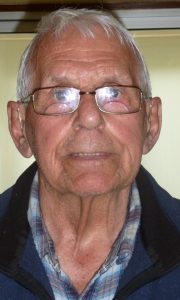
 Ted Hylands is still a working gardener at the age of 91. He has lived in his Fetcham house since it was built by his father-
Ted Hylands is still a working gardener at the age of 91. He has lived in his Fetcham house since it was built by his father-
Interview date: 31 March 2017
Location: Fetcham
Interviewer: Tony Matthews
Family background
[My full name is] Edward Harold Hylands. [I was born] 9 February 1926 [in] Lambeth. My father was a bus conductor after the First World war and he was Harold Hylands. He was a regular in the army. My mother……never went to work. She just brought up my brother and my sister.
We moved to various places. We lived in Chelsea once. Then we moved to Carshalton and then my father bought a house in West Ewell. Then I met my wife who lived just down the road here in Lodge Road. Eventually we got married. It must have been the beginning of the 1950s. [We moved here in] 1953.
Work and wartime
I worked for a time in London making scales, weighing machines as my father-in-law had a part of the business. He worked for them as well. Then I stopped doing that and worked again in Epsom in a firm that did glasswork, blowing glass and stuff like that. Then I joined the services. I volunteered and was in the Royal Marine Commandos. I joined the Royal Marines in 1943 at 17. Eventually I was there D-Day and then after that we came back to England and then we were shipped out to the Far East. I ended up in Hong Kong, just rounding up Japanese and things like that because of the war. They had finished the war when they surrendered. We weren’t there that long. We were there a year or so but then came back home and got demobbed. I could have stayed in but I thought I had had enough.
Then I worked for Ronsons in those days for about three years or so. [I was living] here in Fetcham. We moved into this house in 1953. I was in the repair department. Originally it was over by the Thorndike Theatre where I worked originally because the factory wasn’t built then. The Ronson factory wasn’t built then but when it was built we moved to the factory [in Randalls Park]. [I worked] at Ronsons about five years, I suppose. Then I decided to go on my own and I went to do landscape gardening. Just me. I’m not retired.
Building and gardening
[I started] in the 1960s. There was plenty of work in those days because of all the building – the new builds were all round here. That was really it was. Going [to] jobs in Fetcham, Leatherhead and I did one or two jobs in London. [I enjoyed] all of it, not just one specific thing. I did the whole lot. Going in when the garden was raw, doing the garden and sometimes you were asked to plant it up but not always. Then I did work for a builder. They used to build houses in those days with no boundaries in the front gardens and I did quite a lot here and in Bookham. A lot of the front gardens in Bookham. All round Eastwick, when they were building there I did all the front gardens. Just turfed them all…………….
I had a regular job in The Park in Bookham. I still do gardening now but just gardening. I’ve got one or two little jobs, regular jobs I do and that’s it. I work in Effingham for Mr Rice-Oxley. I go there two mornings a week. Then I do a job for a retired doctor in Leatherhead, Randalls Road he lives. I just don’t want to retire. What would I do? Sit here and watch the box? No. [I work in my own garden] whenever I can, at no particular time. Today, I worked this morning at Rice-Oxley’s and I came home, did a bit in the garden before you arrived. Then maybe at the weekends I’ll do a bit.
Changing area
How has this area changed in your time here?
Oh the trouble is it has changed out of all recognition because of all the building that has gone on since I lived here. There’s a row of six big houses opposite. Warenne Road stopped just by those houses and didn’t go on into Gatesden. There were no houses in Lodge Road over the right hand sided if you are going down Lodge Road. There were none there. In Cock Lane, Hilley Fields didn’t exist. It was just fields and woods. The back of Warenne Road, the houses on the back here, that was all woods. Cock Lane didn’t go through. It was dead-end.
Originally they were going to put the M25 across here at the back but they changed their minds thank goodness. Young Street I remember was just about built. The Canadians built it. It was built before that [official] opening and they had to widen the bridge. The bridge that went over the railway, it was traffic lights. All it was, was an army mobile bridge and then they made it a permanent bridge. They invited the Colonel who was in charge of the original development of that road came over and they named it.
Do you have fond memories?
Yes because it was like living in the country. I used to go to school in West Ewell. I went to a senior school, Daintry Road when it was first opened, the very first pupils that went into there. When we were there, there were a lot of young teachers and we used to cycle down here into Kennel Lane and cut his grass for him, one of the teachers.
The farm that was up here where the junior school is, he had cows and they used to wander down here sometimes. We came home and found footprints all over my front garden where the cattle had been grazing. [Not sheep], he just had cows up there.
Is this still a friendly place?
Well it has all changed now. There are a lot of new people who strange as it may seem don’t communicate as well as when we first came. [But] some of the people who live in those houses opposite are some of the originals. Helen [Hill, a neighbour] used to live down the road before they moved to this detached house here on the corner.
So there’s still a community of some people?
Yes, particularly the houses opposite have changed hands quite a bit but there are one or two who have been there almost as long as I have.
Life now
Do you go to the Village Hall?
Only if the Brass Band is playing…..The Cobham Brass Band. They hold a Christmas concert at the Yehudi Menuhin School every year. I believe they’ve got another concert coming up shortly at the Village Hall. I like brass band music…..My father was a bugler and he was in the army band. But he never passed it on to us.
Do you have siblings?
My brother has passed away now some years ago. He was the eldest. My sister is still alive and she is the youngest and she’s just lost her husband. My sister lives at Walton-on-Thames.
You were married in the 1950s…..
At the parish church here.
Children?
Yes we had two, a boy and a girl, both adopted. Great grandchildren. I’ve got a granddaughter and she has just had another one so we’ve got a boy and a girl great grandchildren. They only live down the road. My daughter lives in [?] or that area. My brother lived in Yorkshire.
Are your children involved in landscape gardening?
My son is a gardener now but he lives in Berkshire. He’s doing gardens.
Did he learn it from you?
Not really. He just took it up like I did.
Former Fetcham
How has Fetcham village changed?
When we came here there were more small businesses, like a butcher’s shop, a greengrocer’s shop and a fish shop and those sort of places. But…. the big shop that is now Sainsbury’s, that didn’t exist. The petrol station, that existed. It was more nearly like tin garage sheds but the owner of it, Ernie, he redeveloped the site and that sort of thing. Then they built where Spring Electric is, that was a greengrocer’s sort of shop. Then they developed this side of it where the fish and chip shop is. Also where Sainsbury’s is was waste ground which they then built and Budgens owned it then. Just this side where the Tandoori Restaurant is, well that used to be a little cafe and the cyclists would come there and stop and have their cups of tea. Then a friend of mine opened a television shop, repairs and that. What you know now as a Tandoori. Opposite that, the other side where the florist is, that was built and there was a furniture and carpet shop. And other small shops.
I don’t think there was much public transport then. Obviously they couldn’t go down Cock Lane as it was a dead-end. I remember the bus station in Leatherhead. That was a bus station where all the buses were stationed there and they repaired them there. When the big flood [in 1968] came they had to get all of the buses out because the whole of the garage was flooded…. My mother stayed here and we couldn’t get out of Fetcham because there was no way out. It was all flooded……..When I worked at Ronsons the buses did run along the Lower Road……but it’s quite recent that they have been going down Cock Lane. That’s not an old route.
Did you always drive to work?
I walked. It was only down there….but I had my own transport. I’ve got this vintage lorry here.
